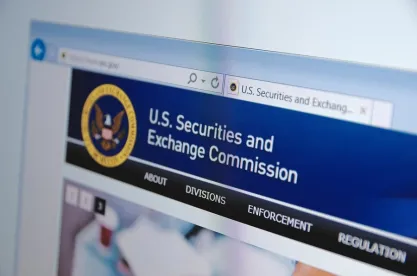The U.S. Securities and Exchange Commission (“SEC”) Division of Trading and Markets recently issued a no action letter to FINRA that may help to streamline the settlement of digital asset securities[1] transactions by broker-dealers that operate an alternative trading system (“ATS”).[2] Depending on the facts and circumstances, an ATS facilitating transactions in digital asset securities may not be subject to an enforcement action if they abide by the following three-step settlement process:
-
The buyer and seller send their respective orders to the ATS, notify their respective custodians of their respective orders submitted to the ATS, and instruct their respective custodians to settle transactions in accordance with the terms of their orders when the ATS notifies the custodians of a match on the ATS;
-
the ATS matches the orders; and
-
the ATS notifies the buyer and seller and their respective custodians of the matched trade and the custodians carry out the conditional instructions.
The custodian will then settle the trade on behalf of the buyer and seller based on the instructions received in the first step.
The three-step process is an alternative to a more cumbersome four-step process articulated by the SEC and FINRA in a July 2019 joint statement on the custody of digital assets securities.[3] The four-step process requires the parties to settle the trade bilaterally and notify or instruct their respective custodians to transfer ownership of the digital asset securities until after the ATS has matched the trade. The four-step model created the opportunity for unscrupulous actors to routinely back away from trades at settlement creating a risk of routine settlement failures.
The three-step process requires a broker-dealer operating an ATS for digital asset securities to comply with several conditions:
-
The broker-dealer must maintain a minimum of $250,000 in net capital;
-
The agreements between the broker-dealer and its customers must clearly state the broker-dealer does not guarantee or otherwise have responsibility for settling the trades;
-
The broker-dealer must establish and maintain procedures to assess whether a digital asset security was offered and sold initially pursuant to an effective registration statement or an available exemption from registration, and whether any secondary transactions of the digital asset security through the ATS are made pursuant to an effective registration statement or an available exemption from registration; and
-
The transactions in digital asset securities otherwise comply with the federal securities laws.
While SEC no action letters only apply to the party requesting the no action relief, this no action letter is important because it was requested by FINRA as a self-regulatory organization. However, the SEC reminded readers of the no action letter:
This position solely addresses an ATS trading digital asset securities under the circumstances set forth in this letter and does not otherwise address broker-dealer custody or control of digital asset securities under Rule 15c3-3. The position of the staff is based strictly on the facts and circumstances discussed in your request, and any different facts or circumstances might require a different response.
The no action letter represents a meaningful improvement to the four-step process for settlement of digital assets that are securities. However, exuberance related to the no action letter and reliance on the no action letter must be tempered because such reliance depends on the facts and circumstances.
[1] The term “digital asset” refers to an asset that is issued and/or transferred using distributed ledger or blockchain technology, including, virtual currencies, coins, and tokens. A digital asset may meet the definition of a “security” under the federal securities laws. The SEC uses the term “digital asset security” to refer to any digital assets that meets the definition of a security under federal securities laws. See Financial Industry Regulatory Authority - ATS Role in the Settlement of Digital Asset Security Trades, SEC No-Action Letter (Sep. 25, 2020).
[2] An ATS is a trading system that meets the definition of an “exchange” under federal securities laws that is not required to register as a national securities exchange if the ATS complies with the conditions to the exemption provided under Rule 3a1-1(a)(2) of the Securities Exchange Act of 1934. See 17 CFR 242.300(a) (defining an alternative trading system) and CFR 242.3a1-1(a)(2) (the exemption from the definition of an exchange for an ATS). An ATS that is required to comply with Regulation ATS must register with the SEC as a broker-dealer. See 17 CFR 242.301(b)(1).
[3] SEC – FINRA Joint Staff Statement on Broker-Dealer Custody of Digital Asset Securities (July 8, 2019).






 />i
/>i
